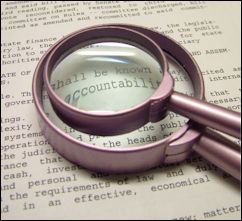 by Joe Fitzgerald
by Joe Fitzgerald
Public officials will sometimes self-censor their emails, memos, and even texts for fear they’ll be embarrassed or caught telling the truth if a Freedom of Information request is filed. You’d think that caution would make them better communicators. Recent history proves that’s not the case. Sometimes it seems the Freedom of Information Act, FOIA, instead frees them to do the bare minimum.
The often unjustified fear of information requests, para-FOIA, ignores how infrequent the requests are, not to mention how vanishingly rare convictions for violations are. Enforcement is by the officials covered by the law, and prosecution is up to the citizen. The real danger, if you can call it that, is a phrase or observation FOIA-ed and ripped out of context and going viral on social media. But in general the people who will do that find it easier to just make stuff up.
One Harrisonburg city department head who bragged about his office’s transparency and openness, when asked for a document, said it had not been filed yet. Asked to inform someone when it was filed, he said they could keep asking back. Asked if a FOIA request was necessary, he said he’d just answer that the document did not exist at the time of the request. I had already set up an automated email to send a FOIA request daily, but then someone besides the uncooperative and non-transparent department head would have to process the request. Essentially, the official did not have to provide the document if he didn’t want to. It was hard to tell if it was laziness, arrogance, or just bull-headedness.
Despite FOIA, not a lot is required of officials who don’t or won’t communicate with their constituents. This came up in Harrisonburg when the city decided to demolish the skate park without telling anybody. City Council decided to spend a third of the city’s $23 million in ARPA funds on recreation – we inherited some money and threw a party – and part of that will go to build a skate park that skaters don’t really want.
The city had already signed a contract for inferior steel ramps by the time skateboarders found out what was planned. They pretty much found out when the old skate park just wasn’t there one day. You can search the news stories for examples of governmental excuses, obfuscation, and just plain mealy-mouthedness. The best example came from the official who answered the accusation that they hadn’t informed skaters by saying there’d been announcements of hearings into how to spend the ARPA money.
Seriously, does anybody out there read “Community asked to prioritize needs in second phase of ARPA engagement” and immediately think they need to show up to keep the skate park from being demolished and replaced with steel ramps? The part in quotes, by the way, was a press release from the city’s publicist, today’s substitute for officials talking to their constituents.
This is the kind of thing observers have been warning about for years with the continuing deterioration of local journalism. With no one watching, the implication has been that officials could line their pockets, hold secret meetings, and award contracts to their friends. But it’s the smaller things that count as well. Twenty years ago when clear-cutting began for the golf course, it capped a year of almost daily coverage and was one of the final straws resulting in me and two others winning City Council seats. Today the city destroys a recreational amenity and leaves its users asking, “What the Hell is ARPA?”
Joe Fitzgerald is a former mayor of Harrisonburg. This column is republished with permission from his blog, Still Not Sleeping.


